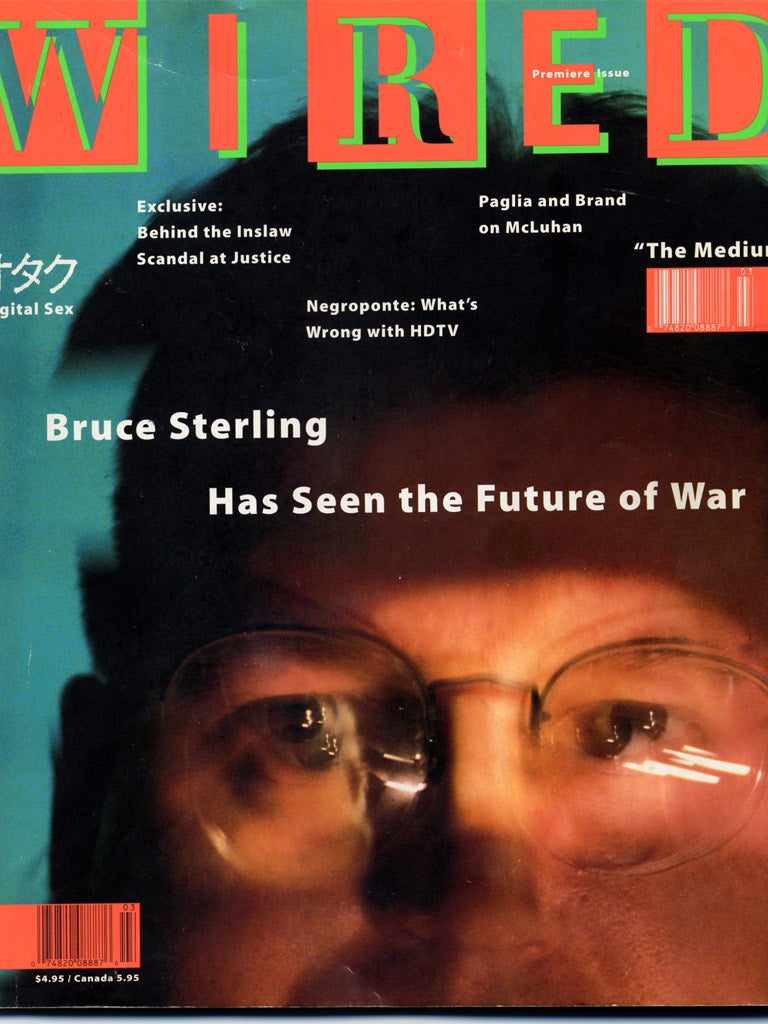It's rare that charity shops provide much in the way of inspiration for the Ideas Factory, so it was a pleasure to discover, while rooting through the shelves of my local Oxfam bookshop, a handful of old copies of Wired. And not just any old copies, the first three ever produced.
It seemed like as good a reason as any to look back at the magazine, which since its launch in the US in the spring of 1993 has become one of the defining voices of the technological revolution, and look at how prescient early Wired was.
I'd anticipated thumbing back through the magazine and sniggering with the arrogance of hindsight about skew-whiff predictions but, unsurprisingly, a lot of the ideas espoused in Wired issue 1.1 are part of the mainstream technological conversation now. Here are just a few subjects:
The electronic library
Years before Google launched the Google Books project to digitise the world's books, heck, years before Google even launched, the debate about the role of libraries in the digital age was well under way.
In Wired 1.1 John Browning looked at the already advanced efforts of non-digital libraries like the British Library and the Bibliothèque Nationale de France to digitise their collections. Browning asked a question that sums up the future economic conoundrum of the web age: "If someday anybody can get an electronic copy of any book for free, why should anybody set foot in a bookstore ever again?"
Wireless email
Back when email was styled E-mail and when 95 per cent of people didn't even have an address, the notion of wireless email seems positively space-age. Page 85 of Wired 1.1 has a short story about Motorola's Embarc, a pager-sized unit that can attach to your computer. Embarc, which cost over $400, lasted until 1996. The BlackBerry was born three years later.
HDTV
Nicholas Negroponte was half right in his p112 prediction in Wired 1.1 that "innovation in programming new kinds of delivery and personalisation of content" are key to the future of TV. Not so much on HDTV, though: "The truth is that all these HDTV systems were constructed on the premise that increasing image quality is the relevant course. This is not the case."
You don't have to go digging around Oxfam to read old issues, though. Wired.com has them all, up to 2006, for free.
Read issue one in full here: wired.com/wired/archive/1.01/
Find an ale like a pro camra man
The Ideas Factory is frequently bombarded with information about new "revolutionary" iPhone apps that are about as interesting as the kind of person who buys 20-year-old tech magazines... but one did manage to catch our eye this week – Cask Marque's CaskFinder (featuring obligatory closed space BetweenWords).
Cask Marque is the standard for well maintained real ales in British pubs and its app has information on 7,500 pubs and more than 1,000 beer descriptions. The idea is that it uses your phone's GPS to find the nearest, best ales. It's free, too (the app, not the beer, sadly).
Sounds good, though reviews so far are mixed. One on iTunes complains about Pure UBU being "beer of the week for the last four months". UBU's nice, but not that nice.
Cleared Parisian debts make its citizens less misérable
We know a canny bit of PR when we see it, but it's hard not to admire the stance of the 375-year-old French bank, the Crédit Municipal de Paris, which celebrated that particular anniversary by wiping away the debts of customers who owed less than €150, about £125.
Assuming that all 3,500 debtors were owed the full amount – the total written off by the bank could be as much as €525,000. Or about 25 per cent of what RBS chief executive Stephen Hester earned last year. So, er, hurray for bankers.
But it's hardly chucking it away; the favourable coverage this ought to earn the bank is likely to be worth immeasurably more than the cost of a couple of 30-second ads on The X Factor (or Le Facteur X).
But perhaps it's not as cynical as you might think. As the Good network's Isabelle Roughel reports here (ind.pn/bankkind), Crédit Municipal has a history of helping out the poor by being founded to offer low-interest loans against valuables – it was said to have been used by the likes of Victor Hugo and Claude Monet.
You may argue that those with debts of only €150 aren't likely to be the poorest people in Paris but a nice gesture remains a nice gesture.
PS. If Natwest wants to commit a similar charitable gesture, cheques can be sent to the usual address.
Send us your factory fuel
Seen a good idea? Email w.dean@independent.co.uk or tweet @willydean
Subscribe to Independent Premium to bookmark this article
Want to bookmark your favourite articles and stories to read or reference later? Start your Independent Premium subscription today.


Join our commenting forum
Join thought-provoking conversations, follow other Independent readers and see their replies